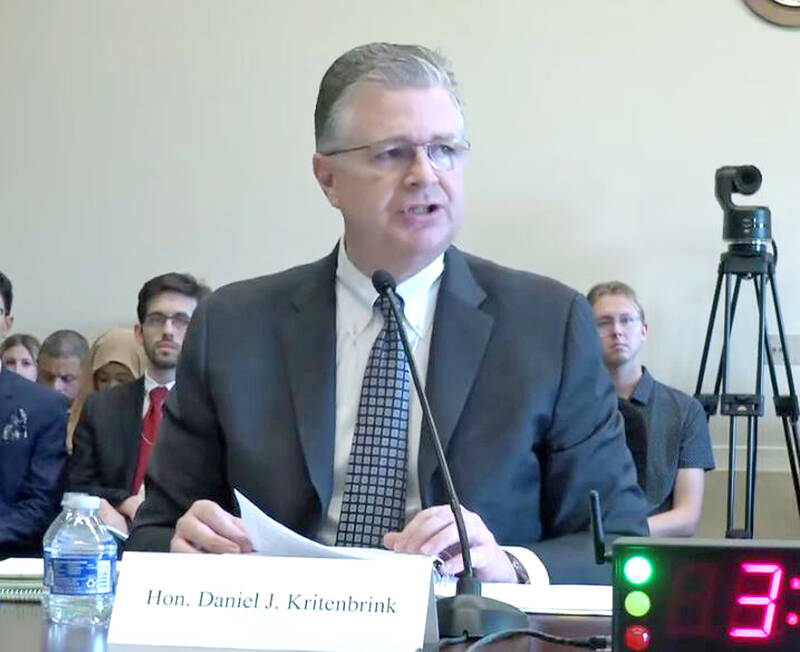The US is “deeply concerned” about China’s new legal guidelines that target advocates of Taiwanese independence, a senior US Department of State official said on Thursday.
“We’re deeply concerned and, if passed as prologue, we’re concerned that China could apply these regulations to others overseas as well,” Assistant US Secretary of State for East Asian and Pacific Affairs Daniel Kritenbrink told members of the US House of Representative’s Foreign Affairs Committee.
Kritenbrink was referring to guidelines introduced by Beijing on Friday last week that allow courts in China to try “Taiwan independence separatists” in absentia.

Photo: Screen grab from the committee’s YouTube channel
Under the guidelines, “diehard” advocates of Taiwanese independence convicted of inciting secession and who are also deemed to have caused “grave harm to the state and the [Chinese] people,” could be sentenced to death.
The guidelines might be used for extraterritorial application of Chinese law in ways that are deeply disturbing, and could also have a chilling effect on cross-strait dialogue and interaction, Kritenbrink said.
China’s move was clearly designed to intimidate people and prevent them from candidly expressing their opinions about the situation across the Taiwan Strait, he said.
Kritenbrink said he would be happy to look again at the Taiwan Travel Act, which was signed into law in 2018 to allow high-level officials of the US to visit Taiwan and vice versa.
He was responding to questions from US Representative Young Kim on whether there were any department restrictions that would prevent President William Lai (賴清德) and other senior officials from traveling to the US for purposes other than a stopover.
There is frequent two-way travel and interaction between Taiwan and US, Kritenbrink said.
“We support travel and engagement,” he said, adding, however, that he had no immediate plans to visit Taiwan.
“Traditionally, based on our robust, important, but unofficial partnership with Taiwan, we don’t have those leader-to-leader meetings that would imply sovereignty,” he added.

US PUBLICATION: The results indicated a change in attitude after a 2023 survey showed 55 percent supported full-scale war to achieve unification, the report said More than half of Chinese were against the use of force to unify with Taiwan under any circumstances, a survey conducted by the Atlanta, Georgia-based Carter Center and Emory University found. The survey results, which were released on Wednesday in a report titled “Sovereignty, Security, & US-China Relations: Chinese Public Opinion,” showed that 55.1 percent of respondents agreed or somewhat agreed that “the Taiwan problem should not be resolved using force under any circumstances,” while 24.5 percent “strongly” or “somewhat” disagreed with the statement. The results indicated a change in attitude after a survey published in “Assessing Public Support for (Non)Peaceful Unification

The CIA has a message for Chinese government officials worried about their place in Chinese President Xi Jinping’s (習近平) government: Come work with us. The agency released two Mandarin-language videos on social media on Thursday inviting disgruntled officials to contact the CIA. The recruitment videos posted on YouTube and X racked up more than 5 million views combined in their first day. The outreach comes as CIA Director John Ratcliffe has vowed to boost the agency’s use of intelligence from human sources and its focus on China, which has recently targeted US officials with its own espionage operations. The videos are “aimed at

‘MISGUIDED EDICT’: Two US representatives warned that Somalia’s passport move could result in severe retaliatory consequences and urged it to reverse its decision Minister of Foreign Affairs Lin Chia-lung (林佳龍) has ordered that a special project be launched to counter China’s “legal warfare” distorting UN Resolution 2758, a foreign affairs official said yesterday. Somalia’s Civil Aviation Authority on Wednesday cited UN Resolution 2758 and Mogadishu’s compliance with the “one China” principle as it banned people from entering or transiting in the African nation using Taiwanese passports or other Taiwanese travel documents. The International Air Transport Association’s system shows that Taiwanese passport holders cannot enter Somalia or transit there. The Ministry of Foreign Affairs (MOFA) protested the move and warned Taiwanese against traveling to Somalia or Somaliland

SECURITY: Grassroots civil servants would only need to disclose their travel, while those who have access to classified information would be subject to stricter regulations The government is considering requiring legislators and elected officials to obtain prior approval before traveling to China to prevent Chinese infiltration, an official familiar with national security said yesterday. President William Lai (賴清德) in March announced 17 measures to counter China’s growing infiltration efforts, including requiring all civil servants to make trips to China more transparent so they can be held publicly accountable. The official said that the government is considering amending the Act Governing Relations Between the People of the Taiwan Area and Mainland Area (臺灣地區與大陸地區人民關係條例) to require all civil servants to follow strict regulations before traveling to China.